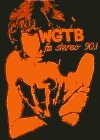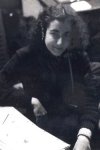
Washington
City Paper
Cover Story:
Radio Free
Georgetown
by Guy Raz
January 29
February 4
1999
 |
|
RADIO FREE GEORGETOWN
Among U.S. college campuses in the late '60s and early '70s, Georgetown was an island of relative calm. While students at Columbia University waged battles against the school administration over plans to destroy part of Harlem for a gymnasium and those at Berkeley went on hunger strikes over free speech, Georgetown was still, by and large, a rather tame place. It was as if the '60s had blown right by.
A flip through the university's 1969 yearbook shows clean-cut kids preparing to be future leaders of America. The only marked difference between that yearbook and those from previous years is the massive addition of the faces of females, recently admitted to the college: Women on cars, women wandering through their restricted dormitories, women sitting in lecture halls. Paris had burnt, and Chicago had rioted; Georgetown was girl-crazy.
The 1970 yearbook, however, reveals a somewhat different environment. People who were on campus that year remember a radical student movement rearing up briefly. A few bold students hung the flag of the Viet Cong; students for a Democratic Society infiltrated the student body, and the 10-member operations board of WGTB-FM was taken over by a group of radicals. They changed the format overnight, making a hard left turn to the rock of Jefferson Airplane, progressive electronic music, and avant-garde jazz. Announcements for campus dances were replaced with dark, subversive political bulletins. If the "pigs" arrested a member of the Black Panthers or the "liberators" held off the "imperialist forces" in North Vietnam, listeners heard about it.
The sandbox became a foxhole, occupied by forces loyal to such radical thinkers as Herbert Marcuse and Franz Fanon. The students' political impertinence was to be short-lived, but potent enough to spark a rebellious energy that would haunt the campus for the next decade.
The city surrounding Georgetown in the early '70s was culturally schizophrenic—more so than in the past, because of the Vietnam War and, later, Watergate. The city's ruling class lived well and believed in the virtue of government. Meanwhile, a culture of dissidents, mostly young and educated hippie stragglers, obsessed over government conspiracies and President Nixon's Machiavellian impulses. They were also terrified of the government, particularly the FBI. A small clot of these angry, suspicious types found a home at WGTB, and the station began not only to operate outside of the dominant culture, but to rail against it.
In many ways, the early '70s were an even more radical time than the late '60s. In D.C., an "alternative community" set up housekeeping in the gentrifying neighborhoods in and around Dupont Circle and Adams Morgan—a mix of Maoists, anti-establishmentarians, refugees from Allende's Chile, collectivists, prog-rockers and dope heads crammed into group houses, exchanging political views, music, and weed.
"Between Vietnam, Watergate, nuclear proliferation, and the Weather Underground," recalls Sunny Pietrafesa, a student and WGTB volunteer at the time, "we all thought we could die the next day." The music at the station suited the mentality, veering toward experimental artists: Todd Rundgren, Peter Gabriel's Genesis, Miles Davis, Manfred Mann, Roxy Music, Zappa, and Captain Beefheart. "You'd smoke what you could get and listen to what was playing," recalls Marty Kurcias, another WGTB alum and Dupont resident at the time. "The radical political ethos was collectivism, Maoism, power-to-the-people shit."
Many members of this tribe lived collectively, bought their food at the Stone Soup Cooperative (now the site of Lauriol Plaza), purchased their books at the not-for-profit P Street Bookstore, flipped through albums at Bread and Roses—a "community-owned, worker-controlled anti-profit record store," according to its flyer—and saw each other at neighborhood head shops such as Earthworks in Dupont Circle. They supplemented their meager lifestyle with unemployment checks, received health care at the Georgetown Free Clinic, and dropped into the Apple Pie and the Cellar Door to hear local bands.
The contemporary lexicon held that if you were "straight," you were certainly heterosexual and subscribed to the middle-class suburban ethos. You had probably voted for Nixon. And unless you were monitoring the airwaves, waiting to pounce on WGTB's next infraction of FCC rules, you didn't listen to the station operating out of the basement of Copley Hall. After all, the station was, in the words of former WGTB News Director Jude Doherty (née Franco), "the cultural focal point for the alternative community."
It was also starting to attract the attention of the conservative university administration.
|